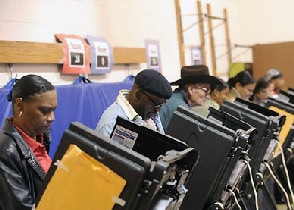Britain has Created a Police State in Turks and Caicos
By: Chris Burke
TURKS AND CAICOS – Britain’s illegal actions in the Caribbean is happening right under the worlds’ nose and despite the warnings of the UN.
The UK has installed its own government in Turks and Ciacos and marginalized leaders and citizens of the islands. The UK took all democracy from the people, including trial by jury, judiciary, voting; it’s a one man direct rule by HE Governor Gordon Wetherell of the UK.
On Saturday, November 21, 2009, UK’s special prosecutor Helen Garlick, also installed in the Turks and Caicos Islands’ government, announced UK’s intention to, “have a permanent presence [in Turks and Caicos].”
The UK had abolished Turks and Caicos’ right to self determination in August 2009, citing local government corruption.
In August, the UK assured Turks and Caicos and the world that new elections would be held in June 2011, restoring governance back to the people at that time. However, based on Ms. Garlick’s announcement and UK’s actions since taking the islands’ constitution, it is evident that the UK has no intention to restore the government back to the people of Turks and Caicos.
The corruption allegations, causing the UK’s take over, emerged from a small group of Turks and Caicos Islanders belonging to a political opposition party. This political activist group (TCI Journal and backers) accuse many developers in the islands of being corrupt while being financed by a competing developer.
Their well orchestrated letters and complaints to the mother land (UK) of last year was admittedly designed to bring down the islands’ government with a goal to create their own government but alleges that it wanted better “fairness” for the people.
The UK was all too eager to jump on board and use the claims of corruption (many anonymous) in Turks and Caicos by calling for a very bizarre one-sided inquiry that failed to explore the whistle blower’s motives and which documented a skewed perspective of foreign resort developers who duly invested in Turks and Caicos.
The inquiry, conducted by a known activist judge from the UK, Sir Robin Auld, made lone determinations in the investigation resulting from the corruption inquiry.
Even more bizarre, the people’s right to trials by jury was abolished as to the entire Turks and Caicos population. This is almost unprecedented.
Ms. Garlick then made a most alarmingly statement following her vow of permanent installation of the UK government: “I continue to encourage members of the public to contact us, if they have information that they wish to give, or if they have any concerns that they want to take up with us.”
To understand why Ms. Garlick’s request for the public to turn in wrong doers is particularly dangerous, it is necessary to explore police state regimes and their resulting oppressive powers over their citizens.
In and of itself, reporting crimes to a prosecutor is relatively benign. However, when you pan out and see that the Turks and Caicos judiciary has been abolished by the UK and appointed solely by the Governor along with the abolishing of jury trials, you can see that this is nothing less than a means to persecute and prosecute anyone without any democratic intervention.
The term “police state” is described as an overpowering government implementing oppressive and repressive controls “over the social, economic and political life of the population … and … there is usually little or no distinction between the law and the exercise of political power by the executive.” The source of the totalitarian action, “is often established by an internal whistleblower or an external critic or activist group.”
In 1933, Nazi Germany adopted the Malicious Practices Act which called for ordinary citizens to volunteer information on citizens’ “suspected infringements of the letter or spirit of the laws”. This had a crucial role in the Nazi’s terrorizing citizens under Hitler’s dictatorship and gave particular power to those who were willing to report their neighbors. This cooperation, by means of the Nazi’s incentive to oppress citizens, by using threats of reports by other citizens, is called Nazi Denunciations.
According to Nazi historian Robert Gellately, these lessons from the past, “impel us to rethink … willingness, consent, and support when these concepts are applied to modern dictatorships.”
What is in it for the denouncers, besides power over the other citizens? Nazi’s took advantage of denouncers as these complainants usually had “selfish purposes” that could be politically exploited by the Nazis. The denouncers received a leveling or settling of a conflict or removal of the conflicting party to the complainant and the seeming support of the nazis.
“In all of these systems, citizens lost many of the traditional means for resolving conflicts, and soon adapted and relied on unmediated access to the means of coercion” and ultimately a fundamental loss of justice.
In addition, according to Gellately:
“In the last two decades, corruption has become a key concern throughout the world. Most of what we know about corruption comes from those instances in which misdeeds become public, usually generating a scandal. Why do some acts of corruption become corruption scandals and others do not? In addressing this question, this argues that scandals are not triggered by corruption per se, but that the emergence of corruption scandals is caused by political competition dynamics within the party or coalition in government. Government insiders leak information on misdeeds in order to gain power within the coalition or party in power.”
There is also sometimes a racial component to the totalitarian and supreme right over another culture. As in a more extreme example, in the case of Nazi Germany, governance was considered absolute and it reserved the highest power over, “Jewish and/or eastern workers” as Hitler was particularly racist of that group. But it is not uncommon for a totalitarian regime to exhibit prejudice over the group in which it feels supremecy over and thus forcibly takes governance. In the case of Turks and Caicos, the UK might have a special prejudice over an island culture that it could see as less sophisticated or worse.
This could explain the British’s take over of the island’s government and its “firing” of Belongers (Islanders) elected officials who might have influence over other Belongers.
Although much less severe, in the United States, the government-sanctioned program called “Wetip” called for citizens to report child abuse; it has had similar problems. Wetip has been deeply criticized as it rewards citizens for helping a government by reporting crimes against each other. This was called denunciation because crime reports skipped usual reporting channels, and on the other hand motives and incentives were not called into question or investigated by the government.
In the Turks and Caicos, an oppressive UK regime has been proven. This is evidenced by UK’s initial use of denunciation and encouragement of denunciation of citizens going forward. This is particularly true because the complainants are rewarded with the removal of their offending party without an investigation into the complainants’ motives.
The right to jury trials for the citizens have been taken, taking typical justice away from the citizens. Local government officials have been all but replaced entirely. Residents of Turks and Caicos are readily terrorized by the threat of denunciation by a group who has been exploited and incentivized to report “crimes” to the UK installed government. The usual process of justice is now easily foregone with this practice of denunciation labeling this island now as a police state with the denouncers as the terrorists working for the supreme and ultimate leader, the UK.
The UK Activist wrote about this action in Turks and Caicos: Direct rule by one man however is not the end of the story. Not only has the parliamentary system been suspended, a fundamental aspect of the judicial system has been abandoned in the decision to abolish trial by jury. Britain has also appointed a special prosecutor from the UK to investigate any corruption charges – Helen Garlick, together with assistance from the UK. Unfortunately she has given the impression that the UK may be there longer than the two years indicated: “have a permanent presence” and has said “I continue to encourage members of the public to contact us, if they have information that they wish to give, or if they have any concerns that they want to take up with us.” Now that may sound reasonable under a democratic political system with an independent judiciary, but in a one man rule state (the governor also gets the say about the judiciary) it is alarming and itself encourages inaccurate, vindictive or mischievous reporting.


